33000 Grain Water Softener

Bye Bye Hard Water !
- Premium cabinet design
- Demand initiated regeneration
- 33,000 grain capacity
- Unique bilingual electronic display
- 360° rotatable connections for easy hook-up
- Space saving design
- Certified to NSF/ANSI44 & CSA B483.1
- 10 year limited warranty
-
Out of stock.
If you questions regarding availability of this product, please call your local store or Rainfresh support.
-
What is hard water ? Simply put, water that contains high concentrations of calcium and magnesium compounds is called hard water . When hard water comes in contact with heat (as in a water heater or a kettle), these compounds form a thick scale that reduces the efficiency of water heaters and increases energy costs. Hard water does not form lather easily and requires more detergent or soap than soft water. With soap, hard water forms soap curd or scum that makes skin dry and itchy, hair lifeless, laundry dull and builds up on shower heads, faucets, sinks etc.
Rainfresh 33R cabinet water softener makes water soft by removing hardness using a process called Ion Exchange. Hardness-causing calcium and magnesium ions are replaced by an equivalent number of sodium ions. Sodium ions do not form scale, thus making the water soft, while maintaining it’s chemical balance.
By installing a whole house Rainfresh cabinet water softener, your laundry come out cleaner and softer, you get spotless glasses and dishes from your dishwasher, enjoy softer bouncier hair and smoother skin after showers and prevent scale build up in your bathroom and water heater. With Rainfresh water softeners you will enjoy soft water for years to come!
BENEFITS
Laundry
- Clothes washed in soft water come out softer and prevent damage to fibers
- With soft water you will use up to 75% less detergent than hard water, saving you money
- Whites come out whiter
- Extends your washing machine life by preventing scale build up
Shower and Shave
- Enjoy softer, bouncier hair & smoother skin after showers
- Prevents shower heads from clogging up due to scale
- Smoother and closer shaves & razors last longer
- Use up to 75% less shampoo and conditioners – saves you $$
Dishwasher
- Spotless glassware and dishes
- No need for expensive dishwasher detergents
- Use up to 75% less detergent – saves you $$
Water Heater
- Reduces energy costs by preventing scale build up in water heaters
FEATURES
- Demand Initiated regeneration – Automatically calculates volume of water it can soften and regenerates only when necessary. Consumes up to 60% less salt than timer softeners
- Salt saving technology – Salt usage can be changed based on water quality
- High hardness removal – up to 65 GPG
- Top of the line electronic controls for high efficiency and ease of use
- Electronic controls with bilingual (English & French) display
- Easily programmable with a touch of the button (cycle time, backwash frequency etc.)
- 360 degree rotatable connector fittings makes installation easy as they can be easily rotated to suit any installation angle or pipe direction. Also reduces cost of extra plumbing fittings
- ¾” NPT elbow or straight fittings
- Compact design – can be fit into tight spaces
- Full flow bypass valve standard
- Stylish design with appliance look cabinet
INSTALLATION
- Installs on main water line before water pipe divides into hot and cold
- Requires air-gap drain connection or drain run can be run to a laundry tub
- Bypass valve included
- 15 ft of drain hose included
- 120V AC power required (consumes only about 8W power)
SALT USE
- Softener salt (sold at most retailers) is consumed in the cleaning/regeneration cycle (It does not go into the water). Nugget or pellet softener salt only recommended. Potassium salt can also be used.
TESTING AND CERTIFICATION
- Tested & certified by IAPMO to CSA B483.1 & to NSF/ANSI 44
WARRANTY
- 10 year limited warranty
-
Download Product Manual (PDF)
- Model 33R Product Manual English
- Model 33R Product Manual French
-
FREQUENTLY ASKED QUESTIONS
1) How will a Rainfresh Cabinet Water Softener make my water better?
Rainfresh softeners remove water hardness. Hard water forms white scaly deposits on shower heads and bathtubs, washing machines, faucets, water heaters and causes spotty dishes from dishwashers. Moreover hard water does not form lather easily, leading to excessive consumption of soaps, shampoos and detergents.
By installing a Rainfresh softener, you will get soft water in the entire house, both hot and cold water.
- Prevents shower heads from clogging up due to scale
- Spotless glassware and dishes
- Enjoy softer, bouncier hair & smoother skin after showers
- Smoother and closer shaves & razors last longer
- Clothes washed in soft water come out softer and prevent damage to fibres – Whites come out whiter
- With soft water you will use up to 75% less detergent than hard water, saving you money.
- Adds years to the life of water-using appliances such as dishwasher, water heater, humidifier, washing machine, etc.
- Reduces energy costs by preventing scale build up in water heaters
2) What does Grain capacity of a water softener mean?
Water hardness is measured in a unit called “Grains per Gallon”. The grains capacity refers to the number of grains of hardness that the unit will remove before it needs to recharge. If your water has a hardness of 10 grains per gallon and your softener has a capacity of 30,000 grains, it means that the unit will recharge in 30,000/10 = 3,000 US Gal. This is a theoretical capacity and actual capacities are slightly lower.
3) How do I know how hard my water is?
If you use municipally treated water, you can call your local water authority and find out your water hardness. For private water supplies, you can get your water tested free by sending a water sample to Rainfresh water test lab.
4) Where do I install the Rainfresh Softener?
For municipally treated waters, the ideal location is just after the water meter, before the plumbing line divides into hot and cold. For well/lake water, the ideal location is after the pressure tank before line divides into hot and cold.
5) How can I easily install the softener?
You can buy (or order) the Rainfresh CKS solder-less connector kit that does not require you to solder pipes. It can also be used on PEX and CPVC pipes and is extremely easy to use. Of course, you can plumb in the unit as well, following local codes and regulations.
6) What do I need to do after the softener is installed?
The only thing you need to do is to add softener salt. Check the salt level every month and add more if necessary. There’s nothing else you need to do.
7) Why does the Rainfresh softener need to recharge?
The softener has a certain capacity of hardness removal. At some stage this capacity is exhausted and the unit needs to dump the hardness down the drain and recharge itself. This is done automatically using the electronic computer valve built into the unit. The interval between regenerations depends on your water hardness and the amount of water you consume every day.
8) Does the Rainfresh Softener recharge based on time or water usage?
Rainfresh softeners are high efficiency and recharges only when necessary, which is based on water usage. Once the input hardness is set, the computer automatically senses the amount of water that is being used and the frequency of regeneration.
9) How much water does each recharge use?
The default settings use as much water as a load of laundry.
10) What kind of salt should I use?
A clean pellet or nugget style salt is recommended. Do not use road salt or any other type of salt.
11) How many bags of salt will I go through every year?
Based on a family of 4, with 15 GPG water hardness, you will approximately consume 16 bags of salt a year. This number changes with water usage, hardness and other factors.
12) Can I use Potassium Salt with the Rainfresh unit?
Yes you can use Potassium salt with the Rainfresh unit, but you will need to make some programming changes to the unit. Call Rainfresh for details.
13) Will I drink all the salt that I put in the unit?
It is a common misconception that the salt goes into the water. Salt is only used to recharge the softener resin with sodium after the resin capacity has been exhausted. Following this salt-recharge, the softener undergoes a rinse cycle during which any left-over salt is discharged to drain. However, soft water does have higher levels of sodium and thus not recommended for people on sodium restricted diets.
14) Will this unit harm a septic system?
Many industry studies have concluded that softeners do not have adverse effects on septic systems. For more information, you may call the Canadian Water Quality Association.
15) How much electricity does the Rainfresh Softener use?
Very little, as much as a digital alarm clock
16) What is the warranty on Rainfresh softeners?
Limited 5 year warranty with a 10 year warranty on the mineral tank. Call Rainfresh for details
Have more questions? Enter you own question below and our customer service will get back to you within 24 hours.
-
For parts, please call Rainfresh customer support, Mon-Fri 8:30 AM to 5:00 PM EST
-
33000 grain water softener cabinet style is a compact unit for delivering soft water for your home. What is hard water ? Simply put, water that contains high concentrations of calcium and magnesium compounds is called hard water . When hard water comes in contact with heat (as in a water heater or a kettle), these compounds form a thick scale that reduces the efficiency of water heaters and increases energy costs. Hard water does not form lather easily and requires more detergent or soap than soft water. With soap, hard water forms soap curd or scum that makes skin dry and itchy, hair lifeless, laundry dull and builds up on shower heads, faucets, sinks etc.
Rainfresh 33,000 grain water softener cabinet style makes water soft by removing hardness using a process called Ion Exchange. Hardness-causing calcium and magnesium ions are replaced by an equivalent number of sodium ions. Sodium ions do not form scale, thus making the water soft, while maintaining it’s chemical balance.
By installing a whole house Rainfresh cabinet water softener, your laundry come out cleaner and softer, you get spotless glasses and dishes from your dishwasher, enjoy softer bouncier hair and smoother skin after showers and prevent scale build up in your bathroom and water heater. With Rainfresh water softeners you will enjoy soft water for years to come!
A two-tank water softener is also available.
BENEFITS OF 33000 grain water softener cabinet style
Laundry
- Clothes washed in soft water come out softer and prevent damage to fibers
- With soft water you will use up to 75% less detergent than hard water, saving you money
- Whites come out whiter
- Extends your washing machine life by preventing scale build up
Shower and Shave
- Enjoy softer, bouncier hair & smoother skin after showers
- Prevents shower heads from clogging up due to scale
- Smoother and closer shaves & razors last longer
- Use up to 75% less shampoo and conditioners – saves you $$
Dishwasher
- Spotless glassware and dishes
- No need for expensive dishwasher detergents
- Use up to 75% less detergent – saves you $$
Water Heater
- Reduces energy costs by preventing scale build up in water heaters
FEATURES OF 33000 grain water softener cabinet style
- Demand Initiated regeneration – Automatically calculates volume of water it can soften and regenerates only when necessary. Consumes up to 60% less salt than timer softeners
- Salt saving technology – Salt usage can be changed based on water quality
- High hardness removal – up to 65 GPG
- Top of the line electronic controls for high efficiency and ease of use
- Electronic controls with bilingual (English & French) display
- Easily programmable with a touch of the button (cycle time, backwash frequency etc.)
- 360 degree rotatable connector fittings makes installation easy as they can be easily rotated to suit any installation angle or pipe direction. Also reduces cost of extra plumbing fittings
- ¾” NPT elbow or straight fittings
- Compact design – can be fit into tight spaces
- Full flow bypass valve standard
- Stylish design with appliance look cabinet
- Sliding salt lid does not come in the way of salt filling
INSTALLATION
- Installs on main water line before water pipe divides into hot and cold
- Requires air-gap drain connection or drain run can be run to a laundry tub
- Bypass valve included
- 15 ft of drain hose included
- 120V AC power required (consumes only about 8W power)
SALT USE
- Softener salt (sold at most retailers) is consumed in the cleaning/regeneration cycle (It does not go into the water). Nugget or pellet softener salt only recommended. Potassium salt can also be used.
TESTING AND CERTIFICATION
- 33000 grain water softener cabinet style has been tested & certified by IAPMO to CSA B483.1 & to NSF/ANSI 44
WARRANTY
- 10 year limited warranty
-
Reviews
Add a review Cancel reply


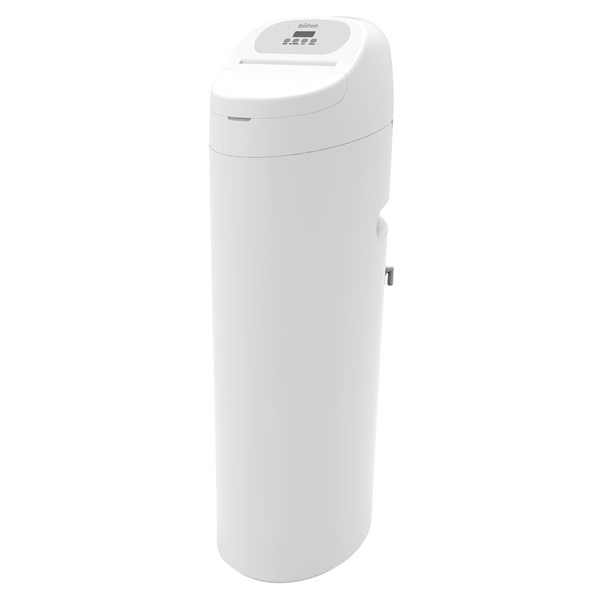
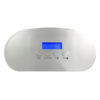
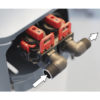
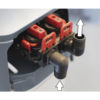
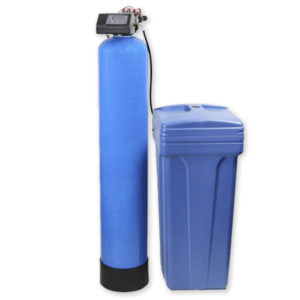
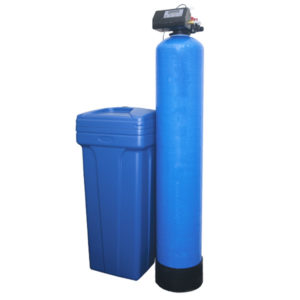
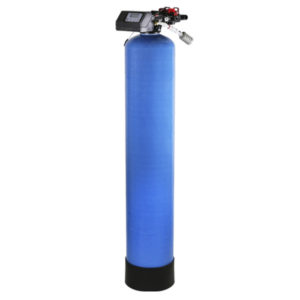
Excellent Softener
Just bought one to replace our old Culligan unit which was consuming too much salt and had problems. This was was very easy to install and the set-up is so simple and easy to understand. I also have a Rainfresh drinking water system for over 2 years and have been very happy with that as well. Highly recommend this!
Professor Richard, Barrie, ON
Lowes.ca
Great addition to our home
I bought this water softener a couple of weeks ago. The installation was fairly simple although a couple of piping fixtures were required. I filled the unit with salt, programmed it as per instructions and let it run. It made a huge difference in our water almost instantly. The water is much softer to the touch, there is no more calcium buildup and skin and hair feel much nicer after the shower.
Paul N, Edmonton
Lowes.ca